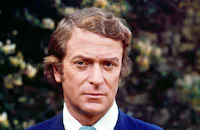The Romantic Englishwoman

Brief Synopsis
Cast & Crew
Joseph Losey
Glenda Jackson
Michael Caine
Helmut Berger
Beatrice Romand
Nathalie Delon
Film Details
Technical Specs
Synopsis
What is real and what is fiction? Faced with writer's block with his novel, Lewis Fielding turns to a film script about a woman finding herself after his wife Elizabeth returns from Baden Baden. She didn't quite find herself there but had a brief encounter in a lift with a German who says he is a poet. Now the German is in England, gets himself invited to tea where he claims he admires Fielding's books. Which one does he like the best? "Tom Jones." Amused at being confused with the other Fielding, the novelist works the German into the plot.
Director

Joseph Losey
Videos
Movie Clip


Film Details
Technical Specs
Articles
The Romantic Englishwoman
The Romantic Englishwoman came later in this streak, and it was not one of her successes, despite a screenplay by playwright Tom Stoppard (Shakespeare in Love, 1998) and author Thomas Wiseman (based on his 1971 novel) and direction by Joseph Losey (The Servant, 1963). Michael Caine plays a writer suffering creative block who tries to make his jealous fantasies about his wife (Jackson) play out as inspiration for his work by introducing into their home a young German poet she encountered on vacation, with disastrous results.
Caine and Jackson weren't Losey's first choice for the roles. He wanted to reteam Alan Bates and Julie Christie, who had been so good together in Losey's acclaimed The Go-Between (1971), a multiple BAFTA recipient and winner of the Palme d'Or at Cannes. Christie declined, claiming she didn't believe there was real chemistry between her and Bates, a lack that actually worked in favor of their earlier Losey pairing. Reportedly Dirk Bogarde, star of The Servant, was also sought for the Caine role, and Harold Pinter, who wrote the screenplay for The Go-Between, was offered a cameo.
Caine and Jackson bounced back from the negative reviews and poor box office performance of this movie. Right on the heels of its release, Caine won acclaim opposite Sean Connery for John Huston's adaptation of Rudyard Kipling, The Man Who Would Be King (1975). His career has never halted its momentum, racking up six Oscar nominations and two supporting actor wins. At the time of this writing (2015), he is 82 years old and still much in demand.
Jackson followed quickly with the title role in Hedda (1975), based on the Ibsen play Hedda Gabler. It was little seen but still brought her a heap of critical praise and another Academy nomination. It seemed during this period she could do no wrong with critics and awards voters. By the 1980s, while still respected, she had mostly fallen out of general favor. After a 1992 TV movie, she retired from acting to pursue a dynamic and successful career as a member of Parliament from the Labour Party (the only Oscar-winning MP to date). She retired from politics in 2015 at 79 amid some speculation that she might return to acting.
Losey also bounced back, with the gripping and intelligent French thriller Mr. Klein (1976). The American-born director's career was one of the most interesting cases to come out of the Hollywood studio system. A student of philosophy and medicine who turned to theater, he worked with Bertolt Brecht and became an important figure in New York theater, involved in some controversial political works. He made his feature film directing debut with the allegorical The Boy with Green Hair (1948), followed by the taut thrillers M (1951) and The Prowler (1951). His leftist associations brought him under scrutiny of the House Un-American Activities Committee in the early 1950s. Rather than face the witchhunt at home, Losey exiled himself to Europe where he worked for the remainder of his life, primarily in Great Britain and France. He died in London in 1984 at the age of 75.
The part of the German poet-hustler was played by Helmut Berger, who at the time was enjoying his own art house popularity as everyone's favorite decadent European for Luchino Visconti in The Damned (1969), Ludwig (1972), and Conversation Piece (1974) and for Vittorio De Sica in The Garden of the Finzi-Continis (1970). His most recent role was as the older version of the famous fashion designer in Saint Laurent (2014).
Director: Joseph Losey
Producer: Daniel M. Angel
Screenplay: Tom Stoppard, Thomas Wiseman, based on Wiseman's novel
Cinematography: Gerry Fisher
Editing: Reginald Beck
Production Design: Richard Macdonald
Music: Richard Hartley
Cast: Glenda Jackson (Elizabeth), Michael Caine (Lewis), Helmut Berger (Thomas), Michael Lonsdale (Swan), Kate Nelligan (Isabel)
By Rob Nixon

The Romantic Englishwoman
Quotes
Yes...and what would it be without them?- Thomas
Trivia
Miscellaneous Notes
Released in United States 1975
Released in United States 1975















